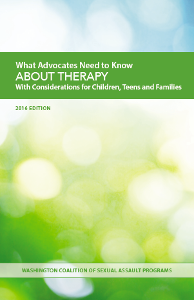In studies of adults who were sexually abused as children, two out of three said they never told anyone about the abuse during childhood (London, Bruck, Ceci & Shuman). Accordingly, we can expect survivors may not seek help until they are adults. As advocates, we should feel prepared to work with adult survivors who may no longer be in an immediate danger of assault and meet these survivors in varied places along the healing spectrum. Here are some considerations in your advocacy with…
- Prevention
- Working With Survivors
- Accreditation
- Advocacy Areas
- Culturally Specific
- Legal Resources
- Management
- Medical Resources
- SA Protection Order
- Subpoenas
- Support Groups
- Tech Safety
- Resources
- Policy
- Training
